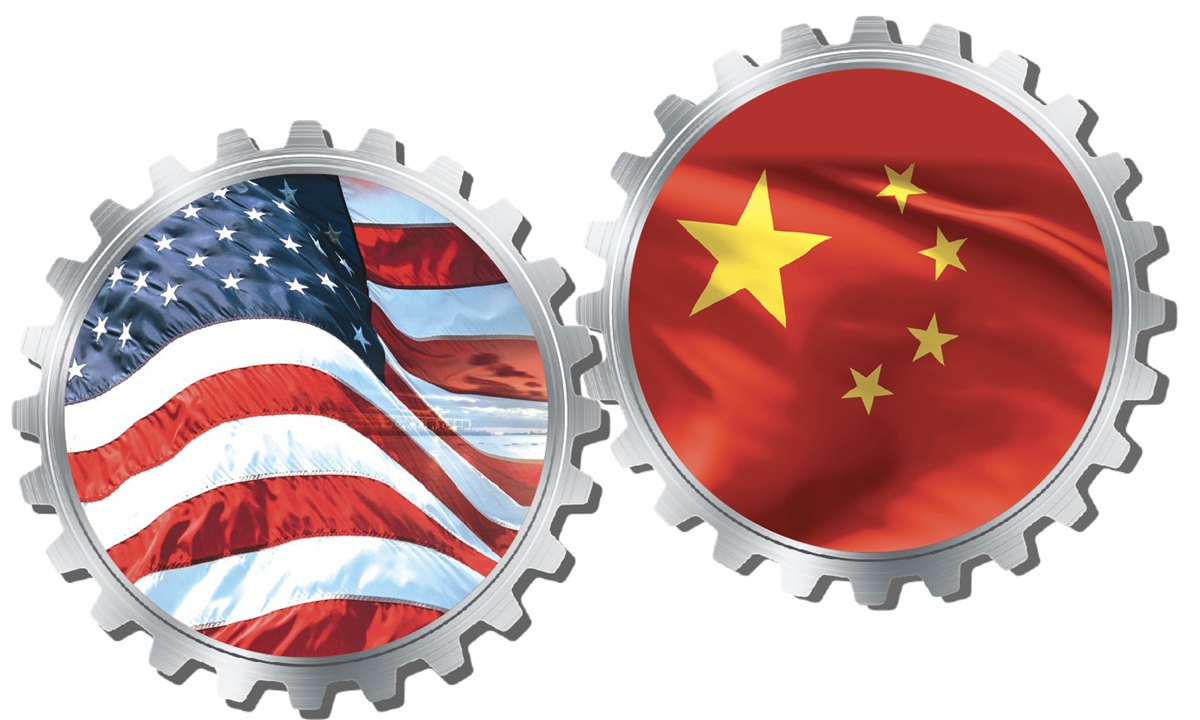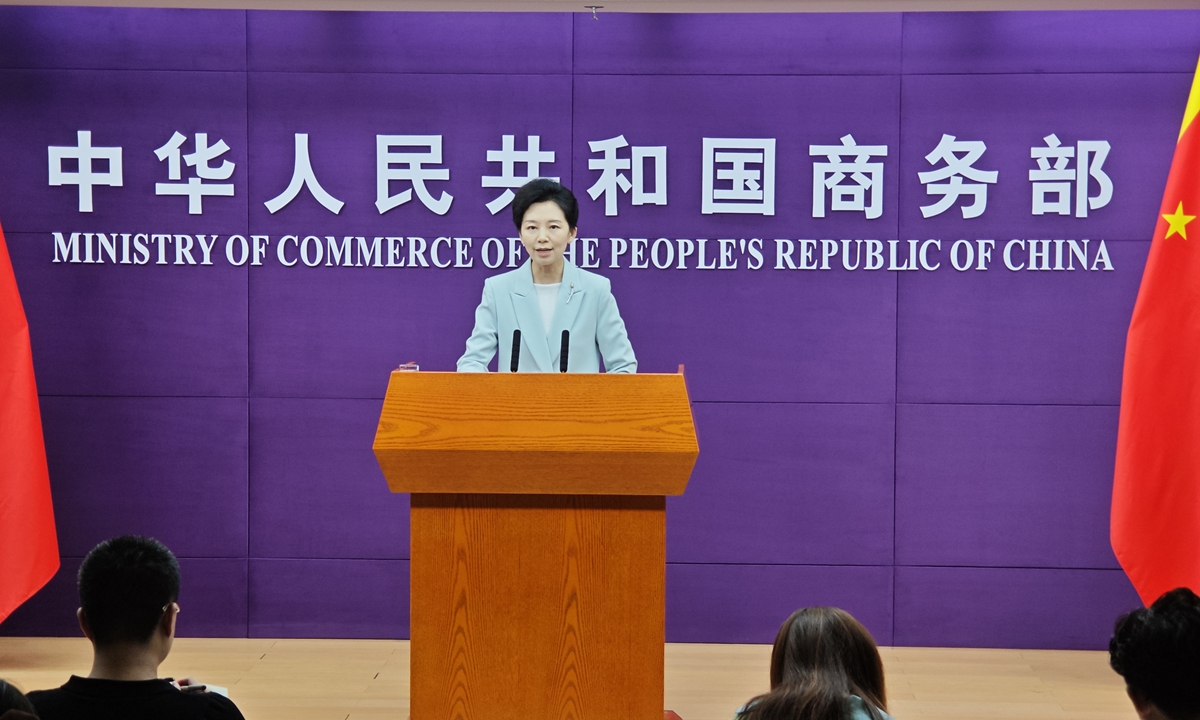US restrictions against China seriously undermine consensus reached during talks in Geneva: MOFCOM

China-US Photo: VCG
Amid China's commitment to implementing the consensus reached at the economic and trade talks in Geneva, Washington has continuously provoked new trade frictions that violated the consensus, while China firmly rejects the unwarranted accusations from the US, a spokesperson from China's Ministry of Commerce (MOFCOM) said on Monday.
Commenting on recent US claims that China has violated the consensus reached in the China-US economic and trade talks in Geneva, the MOFCOM spokesperson said the Chinese side has noted the situation.
According to the statement released by the ministry on Monday, following the release of the Joint Statement on the China-US Economic and Trade Meeting in Geneva, China, in accordance with the consensus reached, canceled or suspended relevant tariff and non-tariff measures targeting the US' "reciprocal tariffs." China, with a responsible attitude, has earnestly addressed, strictly implemented, and actively upheld the consensus of the economic and trade talks in Geneva. China's commitment to safeguarding its rights is resolute, and its implementation of the consensus reflects integrity.
In contrast, the US, after the talks in Geneva, has introduced multiple discriminatory restrictions against China, including issuing AI chip export control guidance, halting sales of chip design software - electronic design automation (EDA) - to China, and announcing the revocation of visas for Chinese students.
These actions seriously violate the consensus reached during the January 17 phone call between the two heads of state, severely undermine the existing consensus of the Geneva economic and trade talks, and significantly harm China's legitimate rights and interests. The US has continuously provoked new trade frictions, exacerbating uncertainty and instability in bilateral economic and trade relations. Instead of reflecting on its own actions, it unjustly shifts blame, baselessly accusing China of violating the consensus, which gravely deviates from the facts. China firmly rejects these unwarranted accusations, the spokesperson said.
The Joint Statement on China-US Economic and Trade Meeting in Geneva is an important consensus reached by both sides based on mutual respect and equal consultation, and its outcomes were hard-won, the spokesperson said, urging the US to meet China halfway, immediately correct its erroneous actions, and jointly uphold the consensus of the Geneva economic and trade talks to promote the healthy, stable, and sustainable development of China-US trade relations.
Unilateral moves
According to the consensus reached by the Geneva talks, the principles for handling China-US relations are mutual respect and equal consultation, with the establishment of a consultation mechanism to address the major concerns of both sides. However, the US has violated these principles by failing to show mutual respect and bypassing the consultation mechanism in dealing with bilateral economic and trade relations. Instead, it unilaterally adopted a series of suppressive measures and then shifted the blame onto China, He Weiwen, a senior fellow at the Center for China and Globalization, told the Global Times on Monday.
If the US continues to harm China's interests, China will resolutely take strong measures to safeguard its legitimate rights and interests, the MOFCOM spokesperson noted.
On Friday, the US President and his trade representative claimed that Beijing was not fulfilling its commitment, the Wall Street Journal (WSJ) reported. The US President wrote on his social-media platform Truth Social that China has "totally violated its agreement" with the US. Shortly afterward, US Trade Representative Jamieson Greer said that China is "slow-rolling" its compliance with the agreement, mentioning rare-earth minerals as a sticking point, according to the WSJ report.
The export control measures are not targeting countermeasures by the US; rather, they represent refinements to China's regulatory system. The management of relevant materials aims to bolster market security and mitigate security risks and shocks, Zhou Mi, a senior research fellow at the Chinese Academy of International Trade and Economic Cooperation, told the Global Times on Monday.
He stressed the importance for China and the US to collaboratively advance toward mutual trust and mutual benefit, noting that interaction and exchange of information related to export controls are necessary to reduce misjudgments and improve the effectiveness of the systems and policies.
Speaking on the US' recent restrictive moves, Wang Peng, an associate research fellow at the Beijing Academy of Social Sciences, told the Global Times on Monday that such moves are practices of "saying one thing but doing another," which undermine the foundation of bilateral economic and trade cooperation and are detrimental to sound and stable development.
Zhou said the US' actions have created new obstacles for the next phase of China-US economic and trade consultations, while altering the current bilateral economic environment and introducing significant adverse factors.
In addition, the unilateral measures taken by the US that breach the consensus reached in the joint agreement will heighten uncertainty in global trade and foster distrust toward the US among nations worldwide, said Ma Jihua, a veteran telecom industry analyst, on Monday.
Strong dissatisfaction
Since the Geneva talks, Washington has been implementing restrictive measures against the Chinese side, especially targeting the high-tech sector, from halting chip software sales to China, issuing guidance warning companies not to use advanced computer chips from China, to reportedly suspending engine sales to Chinese planemaker COMAC.
The restrictions impede technological exchanges between China and the US, reduce synergy efficiency in corporate production and sales thereby increasing costs, and constrain market expansion for relevant Chinese enterprises while diminishing market share and profits for American companies in China, Wang said.
As for the impact on the global industry, Ma said the US' long-arm jurisdiction of crackdowns on China's semiconductor sector has caused severe disruption for the global supply chain, with uncertainties lingering for downstream production and procurement. He noted that the industrial research and development (R&D) process has been severely affected, as corporations now hesitate to invest in innovation while professionals refrain from committing resources to the R&D.
Nvidia CEO Jensen Huang said during a quarterly earnings call last week that the US' export control policy on AI chips to China was "clearly wrong," noting that China's AI will move on with or without US chips due to its abundant AI talent.
Huang's remarks are just a representation of the US restrictive measures and tariff curbs gaining opposition from affected parties.

